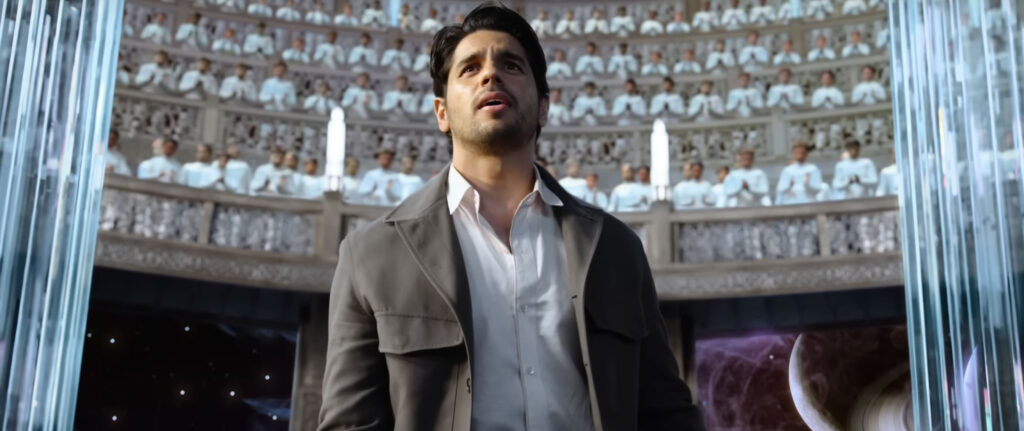October 29, 2022
by Carla Hay

Directed by Indra Kumar
Hindi with subtitles
Culture Representation: Taking place in 2018, in India and in heaven, the comedy/drama/fantasy film “Thank God” features an all-Indian cast of characters representing the working-class and middle-class.
Culture Clash: After getting into a car accident that leaves him unconscious and near death, a selfish real-estate agent’s spirit is transported to heaven, where he must pass a series of tests to determine if he will go to heaven or hell after he dies.
Culture Audience: “Thank God” will appeal primarily to fans of stars Ajay Devgn and Sidharth Malhotra and stories about the afterlife, but this movie is neither clever nor interesting.

“Thank God” is a fantasy film about the afterlife that puts schmaltz over substance. Much of the movie is set in heaven, but there’s nothing heavenly about the cloying manipulation and gimmicks in this feeble and clumsily constructed story. The movie crams in some very silly plot twists that further ruin what could have been an intriguing story about life after death and redemption.
Directed by Indra Kumar, “Thank God” is a remake of the 2009 Danish comedy film “Sorte Kugler” (which means “what goes around” in Danish) and follows the same basic concept, but “Thank God” changes the deity characters to those from the Hindu religion. Aakash Kaushik and Madhur Sharma co-wrote the unimaginative “Thank God” adapted screenplay. The movie has scenes that take place in India and a location described in the movie as heaven.
In the beginning of “Thank God,” which takes place in 2018, Ayaan Kapoor (played by Sid Malhotra) is a 33-year-old real-estate agent who has fallen on hard times. He used to be a hotshot, successful agent. But he lost his fortune due to the Indian government’s demonetization of currency. Ayaan is now in debt to 16 crores, which is about $140,000 U.S. dollars in 2018.
Ayaan wants to sell his house, which has not yet found a buyer. In the meantime, Ayaan and his wife Ruhi Kapoor (played by Rakul Preet Singh) and their daughter Pihu Kapoor (played by Kiara Khanna), who’s about 4 or 5 years old, have moved into the house owned by Ruhi’s family until Ayaan can get back to the financial status that he used to have. Ayaan and Ruhi (who is a police officer) had a whirlwind, romantic courtship. But lately, the marriage has been strained because of Ayaan’s financial problems and because of his arrogant and workaholic ways.
Ayaan’s money problems have not humbled him or made him re-evaluate his life. He is still the same conceited real-estate agent who makes his work a higher priority than his family. In some ways, Ayaan has become even more ruthless, self-centered and ill-tempered than before his financial crisis, since he’s determined to never lose his fortune again. As an example of how cold-hearted Ayaan is, when he walks by a poor, elderly woman begging for money on the street, he doesn’t just ignore her. He’s very rude to her when refusing to give her any money.
During a real-estate deal that Ayaan hopes to close, a married couple is close to buying a house that Ayaan is selling. The spouses tell Ayaan that they are buying the house for their adopted son Chiku (who’s about 5 or 6 years old), so that the Chiku can inherit it when he becomes an adult. Chiku is waiting outside the house when Ayaan congratulates him on having wonderful adoptive parents.
Chiku begins crying because he tells Ayaan that he didn’t know that he was adopted. A panicked Ayaan doesn’t want Chiku to tell the parents that Ayaan disclosed this secret to Chiku, so he locks Chicku in the house’s bathroom and plans to keep Chiku in there until the parents sign the paperwork to close the deal. However, the parents notice that Chiku is missing, and they start to look for him. Ayaan acts like he doesn’t know anything about the child’s disappearance.
Meanwhile, Chiku has snuck out of the bathroom window and goes in the room where his parents and Ayaan are talking. Chiku starts wailing again and tells his parents everything that happened. Needless to say, the parents get angry and don’t do the deal with Ayaan. This is the type of comedic scene that could have been funny, but the substandard acting in the movie just makes everything seem so silly and trite.
Ayaan has a real-estate deal in his not-too-distant past that also brought unhappiness, for different reasons. A couple named Mr. and Mrs. Gaikwad bought a bungalow for 150 million rupees (about $1.8 million U.S. dollars in 2018), but the spouses are now been forced to sell the home because of financial problems. Ayaan wants to buy the bungalow for himself and his family, knowing that Mr. and Mrs. Gaiwad will be losing their home to him. Ayaan’s decision on how to deal with the couple’s problem comes back to haunt him.
In the meantime, Ayaan is upset that he lost out on this most recent real-estate deal because of his extreme way of trying to silence an innocent child. Aayan calls Ruhi on hs phone while he’s driving to complain about losing the deal and to let her know that he won’t be able to attend the Parent Teachers Association meeting for their daughter Pihu. Aayan is holding his phone in one hand while he’s driving. And you know what that means: He gets into a car accident when he takes his eyes off the road and crashes into another car.
The next thing that Ayaan knows, he’s been transported to a mystical-looking place that can best be described as a floating amphitheater, with spectators who are dressed all in white. Ayaan is escorted to a stage in the middle of this amphiteater. Ayaan’s guide to this stage is someone calling himself YD (played by Mahesh Balraj), also known as Yamdhoot, who is a Yamaduta, a Hindu messenger of death. YD introduces a confused Ayaan to someone named CG (played by Ajay Devgn), who is supposed to be the Hindu deity Chitragupta.
CG explains to Ayaan that Ayaan is in heaven, and Ayaan’s unconscious body is currently on Earth, where Ayaan is in a hospital undergoing an operation for the next five hours because of his car accident. CG shows Ayaan a vision of Ayaan in the operating room. In the meantime, CG says that Ayaan will have to play the Game of Life to determine if Ayaan will go to heaven or go to hell if he dies in the hospital.
Ayaan refuses to play this game at first, but CG shows Ayaan a preview of what life in hell looks like. (The movie has very outdated-looking and unconvincing visual effects.) Ayaan quickly changes his mind when he sees the terrifying existence he would have in hell. At the same time, Ayaan’s hubris makes him think that whatever game he plays, he’s going to win.
In this game, Ayaan has to take several challenges based on each of his biggest flaws. Two see-through cylinders (each about 10 feet tall) are placed on the stage. If Ayaan loses a challenge, the spectators throw black balls into the cylinders. If Ayaan wins a challenge, the spectators throw white balls into the cylinders. Ayaan will lose the game if both cylinders overflow with black balls.
The six challenges based on Ayaan’s personality flaws are essentially variations of Christianity’s seven deadly sins, except for the sin of sloth, which doesn’t apply to workaholic Ayaan. The six rounds that Ayaan goes through to complete the game have to do with his anger, greed, jealousy, pride, lust and deception. In each round, Ayaan is put in a simulated reality scenario, and he has to decide what to do when a particular personality flaw is tested.
For example, in the round where his anger is tested, Ayaan is stuck in an elevator with an irritating, talkative man who keeps doing things to delay the elevator from moving. In the round where Ayaan’s jealousy is tested, CG reveals to the crowd that Ayaan wanted to become a police officer when Ayaan was a child, so Ayaan is secretly jealous that his wife Ruhi is a police officer who recently got a job promotion. In this challenge, Ayaan is given a chance to be a police officer during an armed robbery of bank, where the bank robber is holding hostages.
“Thank God” aims to impart serious messages about ethics and morality, but the comedy is awkwardly placed and cheapens all of the movie’s moralistic preaching. The slapstick comedy just isn’t very clever. And all of the cast members turn in performances that range from mediocre to embarrassingly exaggerated. Nora Fatehi has a supporting role as Reema, a gold-digging temptress who sets out to seduce Ayaan in his “lust” challenge round, which is just an excuse to have the movie’s most extravagant song-and-dance sequence.
The movie becomes more and more ridiculous with sudden plot twists that look like the filmmakers didn’t really know how to end the movie and just threw in lot of ideas to try to make the conclusion look impactful. It all just looks like a jumbled heap of mushy stereotypes instead of a cohesive story. The last 15 minutes of the film are particularly sloppy.
Several movies have already covered existential topics of humanity that ask these questions: “What happens to people after they die?” and “Do the actions of people when they’re alive affect what happens to people after death?” Most religious teachings have some basis in trying to answer these questions.
Because many films have covered these well-worn topics, “Thank God” had an opportunity to present a unique and intriguing angle to these topics. Instead, “Thank God” took the laziest route, by serving up a stale story that doesn’t really entertain audiences but just insults audiences by pandering to over-used and predictable clichés. If any viewers who believe in a god decide to watch the horrific “Thank God” until the very end, they might be thinking at the end of the movie: “Thank God this mess is finally over.”
T-Series Films released “Thank God” in select U.S. cinemas and in India on October 25, 2022.
